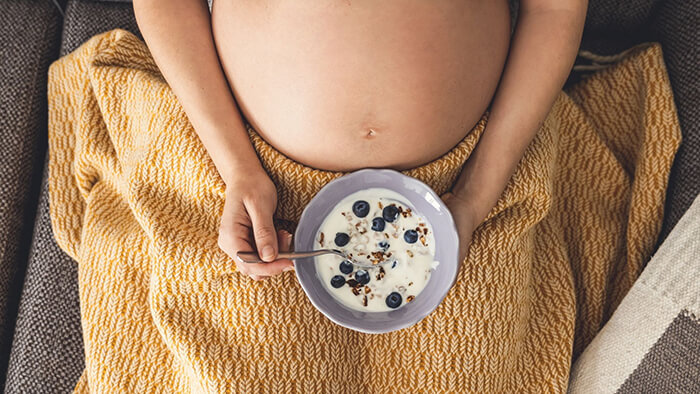
Being pregnant is kind of amazing when you really think about it - you’re growing a tiny human! There are plenty of hormonal changes going on in your body during this time, however, so it’s not unusual to have some weird and whacky food cravings.
Your body does have a need for additional calories to aid in the gestation process, however the concept of ‘eating for two’ doesn’t mean that you need to consume the calories of two grown adults. Depending on your stage of pregnancy and how many babies you’re carrying, you’ll generally only need 300-500 extra calories a day. That’s the equivalent of an extra small-ish meal or two decent-sized snacks.
Food choice is important during pregnancy, not only to ensure you have consistent energy throughout the day, but to ensure your little one is getting all the vitamins and nutrients they need to develop properly.
If you’re having a tough time with morning sickness or other pregnancy-related symptoms, you may like to check out these safe and natural remedies for soothing common pregnancy symptoms.
The Importance of Nutrition During Pregnancy
Making smart food choices can help you have a healthy pregnancy and a healthy baby. The food you’ll eat during your pregnancy will play a critical role not only in physical nourishment, but also in emotional, and mental nourishment for you and your little one to achieve its optimal development.
Your body will need more Folic acid to prevent certain birth defects, Iron for your baby’s growth and brain development, calcium to help build your baby’s bones and teeth, Vitamin D to help calcium, and more.
Bonus: You can also learn more about pregnancy power foods here.
What Foods Should You be Eating During Pregnancy?
Every woman’s pregnancy experience is different, and that goes for the types of foods you can stomach; particularly in the first trimester.
And while your friends, family and co-workers will all have an opinion on what you should and shouldn’t be eating, as long as you’re getting a good balance of nutrients and enough calories to support the growth of your baby, you’re doing just fine.
A good rule of thumb is to have at least three colours on your plate at each meal, and limit your treats to 2-3 a week. Ensuring you get plenty of protein and veggies can also help with your energy levels, giving you an even, sustained level of energy (rather than the sugar crash you get after eating too many sweet treats!)
What Foods Should be Avoided in Pregnancy?
Sadly, some of the foods that the experts recommend you avoid during pregnancy are some of our favourites: soft cheese, deli meats, sushi and runny poached eggs. Beverages containing caffeine should be limited during pregnancy, and alcohol should be avoided.
It may feel like a very long 9 months without a coffee or a cocktail, but we promise it’ll be worth it! We’ve included a list of foods to avoid during pregnancy to help you achieve your baby’s optimal growth.
What Should You Eat for Morning Sickness?
Nausea and vomiting are extremely common during the first trimester of your pregnancy. Those surging hormones are the culprit yet again – the same ones responsible for your sore breasts and the exhaustion that’s synonymous with the first trimester.
Interestingly, your sense of smell is super sensitive when you’re pregnant, which is why some food smells may make you feel nauseous. It’s a throwback to our caveman days when we didn’t have refrigeration or easy access to food – your nose
If you’re feeling nauseous during pregnancy, here are a few foods that may be a little more palatable
For meals:
- Cold foods (sandwiches, raw vegetables, and a freshly prepared salad)
- Bland foods (chicken soup, broth, and baked potatoes)
- Fresh fruit and vegetables
For snacks:
- SAOs or dry biscuits
- Dry cereal (just watch that sugar content!)
- Icy poles
- Pretzels
- Popcorn
- Jelly
For drinks:
When is Diet Most Important in Pregnancy?
A well-balanced diet is essential at every stage of pregnancy, but there are certain stages when your requirement for different nutrients may vary. Let’s break it down:
First Trimester
The basic water-soluble vitamins B & C are important for your first trimester. One of the most commonly recommended first-trimester vitamins is Vitamin B9, or folate, which helps protect your baby from the risk of neural tube defects.
Vitamin C is also important during all stages of pregnancy, but particularly in the first trimester when you may feel run down and be more susceptible to catching colds and flus. And the benefit? Vitamin C helps you absorb the iron you’ll need throughout your pregnancy!
Good sources of folate include:
- Dark green leafy vegetables
- Beans
- Peanuts
- Sunflower seeds
- Fresh fruits, fruit juices
- Whole grains
- Seafood
Second Trimester
During your second trimester, it’s important to take a prenatal multivitamin to ensure you’re meeting all your vitamin and mineral needs during pregnancy.
Foods containing omega-3 fats and Iron are vital for your baby’s brain development. Have a chat with your healthcare provider to see if you need additional supplementation.
Important tip: While fish can be an extremely healthy part of your pregnancy diet, it’s best to avoid large fish such as tuna, swordfish and flake, due to potentially high levels of mercury.
Third Trimester
The third trimester is a whole new ball game, as there’s an increased demand on your body as your baby nears its due date. Iron and protein are particularly important during this time, as they promote healthy bone development and a healthy placenta.
At the end of the day, ensuring that you consume a wide variety of whole foods will give your little one the best possible start to life. That doesn’t mean you can’t have a treat here and there, though! Chat with your healthcare provider about a diet protocol or meal plan that works for your lifestyle and budget.
